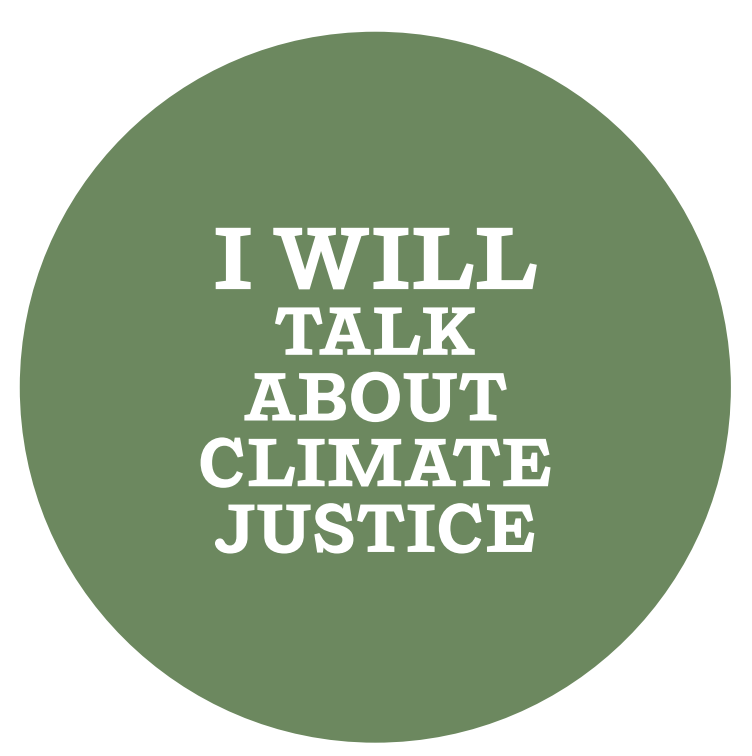COMMIT TO ACTION!
A fast phase-out of fossil fuel use is necessary but not sufficient for a climate-safe and just future. We must prioritize equity in the distribution of the benefits and inevitable costs of the transition to a regenerative economy. Otherwise we will lock ourselves into yet another unsustainable system.
We must raise our voices for direct government action to phase out fossil fuels. This requires that we keep the industry out of policy decision-making; spread understanding about how it works, through deception and racism; and otherwise weaken its social license to operate.
We must also prioritize climate justice demands, including the meaningful inclusion of Black, brown, Indigenous, and low-income white communities in decision-making about the transition ahead. We need direct reparative efforts to address the abuses and harm inflicted by the current system.
In addition to the moral grounds for climate justice, any attempt to decarbonize without this focus would be infeasible. The fossil fuel economy and the climate crisis have been fully bound up with racist hierarchies in every moment of their histories. Ultimately, everyone benefits from this undertaking, or no one does.
WE ARE ALL ONE—AND IF WE DON'T KNOW IT, WE WILL LEARN IT THE HARD WAY.
—BAYARD RUSTIN
IF TAKING ACTION SEEMS DAUNTING, REMEMBER THREE THINGS:
The fossil fuel industry is weaker than you think and weaker all the time.
Clean energy and climate justice are astoundingly popular. If you are a US adult, you are part of a supermajority (69%) that wants to see the end of fossil fuels in the next 25 years, and an even larger supermajority that wants to see key reparative climate justice policies realized.
Speaking has a ripple effect. When we raise our voices, we empower others to break the climate silence too.
TOGETHER, we build a sense of shared public priority by voicing, and acting on, our thoughts, views, and feelings on climate.
TOGETHER, we create a vibrant, insistent, inclusive culture for action.
This sticker installation helps us all see that WE ARE NOT ALONE in caring and taking action. Every sticker features a specific step you can take alongside others and empowers the visitors who come after you to act as well.
You are creating a broad, powerful community for a climate-just future.
Here are some actions we hope you will consider. For detailed suggestions, see the linked instructions.
I WILL TALK ABOUT CLIMATE JUSTICE
Experts agree it is one of the best things we can do. Raise your voice with friends and family, talk about climate justice in your workplace, and mobilize your circles of trust and influence. Let everyone know that racism and the climate crisis are interwoven and that climate justice supporters are a supermajority in the US.
I WILL SEND A POSTCARD
It is more important than ever to speak up, and writing to your representatives is a simple way to make your voice heard. Many people are not aware that mail from constituents is documented and tallied. Policymakers know that one person's postcard often represents the shared opinions of hundreds, if not thousands, of others.
I WILL VOTE FOR CLIMATE JUSTICE
More and more candidates are prioritizing climate justice. This is not just true at the federal level—it applies to state and local elections too. Vote for candidates who support climate action and climate justice, who refuse fossil fuel campaign donations, and who acknowledge the need to right historical wrongs.
I WILL OPPOSE THE FOSSIL FUEL INDUSTRY
Advocate against subsidies. Why are our tax dollars supporting the industry that is destroying communities around the world and threatening us all? You can also advocate against industry presence at the UN, or for your representatives to stop accepting fossil fuel donations.
Or all of the above!
I WILL...
Identify your own action. Is there something you have seen in the show or in your community you would like to address? For example, will you advocate for climate reparations, for more street trees, or for federal heat protections for outdoor workers? Will you join an environmental justice organization? Will you march?









